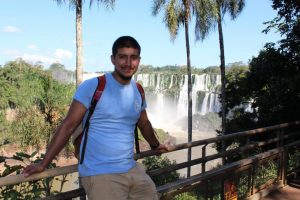
I interviewed Rafael A. Nunez Jr. for my Oral History Project. Rafael is a Dartmouth '18, who went on the CCESP Nicaragua Trip in December 2015. Rafael was a part of the Community Development team and that particular year they focused on building latrines and stoves. In a total of 10 days, they were able to help build 4 of these stoves as well as 4 latrines.
He is very service oriented, besides his work on this trip, Rafael is also involved in the America Reads program as well as the Chair of the Big-Sib, Little-Sib program at Dartmouth College.
I sat down twice to talk to Rafael about his experience in Nicaragua. During our first discussion, he shared with me this story:
“I remember this one time when we were working on a latrine. Me and one of the Nicaraguan workers that was hired to help were in the ditch working back to back on the latrine. It’s a really tight space so we were literally back to back just working on the thing. And this guy opened up to me and started telling me about his daughter and her dreams and how proud he was of her. It was experiences like that that made it hard to leave. Even though the physical work was demanding, breaking emotional ties like that one was the hardest part of the trip for me.”
I also asked him on his opinion on whether or not these service learning programs and trips are the best way to help communities or if in the end it would actually be better to just send money- to which he replied:
“This one [CCESP] does it right. Before going you learn so much about their culture and history so that when you actually go there you have a better understanding of the place and people. You also reflect on what going there means, then when you go you actually do all the work that you say you were going to do and once you come back you keep reflecting on your experience in order to keep improving the model and learning from it. Maybe there is a better way to do service trips but I don’t think just sending money there is the answer. It’s easy for money to get lost in the system and you lose the ability to actually give the people what they want and need. If you actually go you can channel the money and resources directly to ensure that they get what they most need.”
When I asked Rafael whether or not this trip changed him, he replied that it has made him more critical of how service and service programs are structured. He is a strong believer in the approach Bridges to Community implements in Nicaragua because their model ensures that Nicaraguan communities do not become dependent on outside help, but instead are learning the skills to later help themselves. Furthermore, it has changed the way he travels. He recently traveled to Europe and found himself focusing more on interacting with the communities there then simply seeing the sights.
Rafael plans to return to Nicaragua next year as a Community Director of the CCESP.
Below is a segment of my second interview with Rafael: